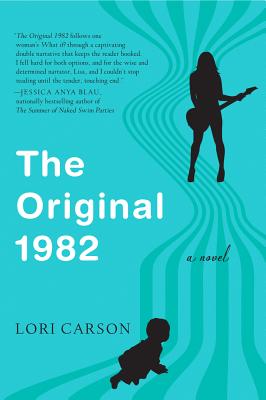
The Original 1982
by Lori Carson
William Morrow & Company; 240 p.
Have you ever wished you could re-live your life, going back and fixing one crucial error and then seeing how the rest of it played out? Singer-songwriter Lori Carson gets to play out this enviable scenario in her wistful debut novel The Original 1982, seemingly loosely based on her own decades-long career in music, and her fateful decision in 1982 to have an abortion rather than carry her musician boyfriend’s baby to term. In The Original 1982, Carson introduces us to “Lisa,” a 24-year-old waitress and aspiring singer-songwriter, who is dating a famous Latin singer, Gabriel Luna. (It’s the first of many echoes of Carson’s real life; she for years dated the popular singer Ruben Blades). Lisa gets pregnant and agrees with Gabriel to have an abortion. But at the last minute, under sedation, she realizes that she has to keep the baby, and does.
What happens next is sort of the polar opposite of what happened to Carson in real life. In real life, childless, she was the subject of a major label bidding war, and released a debut album on Geffen Records to much acclaim. A stint in the seminal 1990s band the Golden Palominos followed, along with three more acclaimed major label solo albums, world tours, and opportunities to write music for films like Stealing Beauty, Strange Days, and many more. It helps to know these facts about Carson’s real life, as it adds to the book’s sweet pathos. Knowing a little of Carson’s history can make The Original 1982 read like a semi-autobiography of a woman looking back at her life and wondering “what if?,” sort of in the same vein as Lorrie Moore’s Who Will Run the Frog Hospital.
In The Original 1982, Carson gets to imagine a woman like herself, but with a child. The book’s first two sections tell a story of a life that might seem more ordinary, I suppose, than the life of an acclaimed singer-songwriter’s. Lisa has the baby – Minnow – and Gabriel Luna marries someone else. Rather than sue him for child support, Lisa gets help from her parents and her friends, then goes back to work as a waitress, but one with dreams of being a musician. She keeps writing songs (Carson borrows her own songs’ lyrics as stand-ins for Lisa’s) though it’s hard to juggle being a mother to Minnow and work. She eventually achieves some small recognition. No world tours, no, but definitely some meaning and purpose.
In the book, Carson seems to be making a statement about the choices we all make, and the paths the choices lead us down. Everyone has made what appears at first glance to be a mistake, but then realized (or didn’t) that a fine life proceeds anyway. Either way, the years drift by. I wonder what it says about me that I prefer Carson’s life to Lisa’s? (Full disclosure: I have all of Carson’s records, and her writing style – a playful pessimism suffused with poignancy – was a huge influence on my own songs, when I wrote them.) Carson writes her novel the same way she wrote music: there’s tremendous sadness in this book, but also a joy of life and a clear-headed puncturing of her own ego. Sometimes when I’d go see Carson play live in New York, she’d play her electric guitar so lightly it almost seemed like she wasn’t even touching the strings, and the audience would practically hold its breath so as not to miss her lyrics. In this beautifully-written novel, she has a similarly light touch. Present-day Lisa’s narration of the story is nostalgic, which makes sense – after all, to re-imagine your own life is to be nostalgic. But the narration is also gentle and wise. Lisa thinks at one point: “Life is full of distractions. Still, nothing throws you off course like the obsessiveness of love. But would life be worth living without it?” That’s not the kind of thing that most people think in the moment, but The Original 1982 is not about the moment, it’s about a woman looking back at the moment that’s already come and gone.
The book’s final third re-introduces Lisa as a childless woman again, a version closer to Carson’s own life. She buries her father (as Carson herself did a couple of years ago), scores a film, plays a song for an adoring crowd, and wonders who her child would have been if she’d had her. She starts making notes for what might become a book. Near the book’s end, Lisa runs into Sofia, an old friend of hers from her waitressing days. Sofia is hanging out with her three-year-old grandson. “’Are you still singing?’ Sofia asks. ‘I have your music on my iPod. I’m so proud of you!’” Lisa muses about this. “I tell her I’m not singing so much, but that I’m still doing music. I don’t say that I would trade it, in a second, to have what she has.” I wonder if Carson knows that most people would trade everything they had to have had a life like hers?
Follow Vol. 1 Brooklyn on Twitter, Facebook, Google +, our Tumblr, and sign up for our mailing list.

1 comment
If you’re interested, I posted a lovely podcast with Lori Carson about The Original 1982 and her music career. It’s at http://chimeraobscura.com/vm/podcast-little-suicides-little-fish